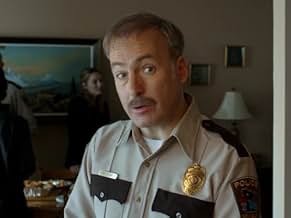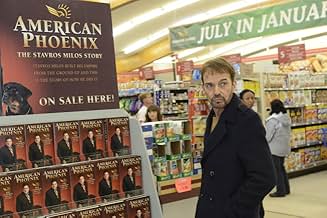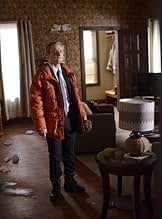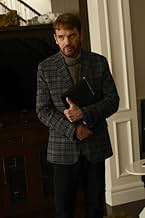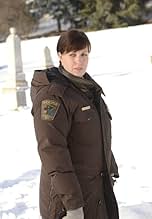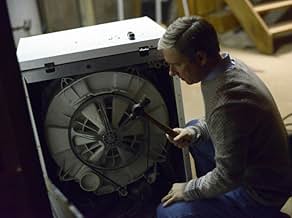Molly begins to suspect that Lester is involved in the murders, but her boss points her in a different direction. Meanwhile, Malvo investigates the plot against a man known as the Supermarke... Read allMolly begins to suspect that Lester is involved in the murders, but her boss points her in a different direction. Meanwhile, Malvo investigates the plot against a man known as the Supermarket King.Molly begins to suspect that Lester is involved in the murders, but her boss points her in a different direction. Meanwhile, Malvo investigates the plot against a man known as the Supermarket King.
- Chaz Nygaard
- (as Josh Close)
Featured reviews
As before, the appeal of this series lies in a colorful bunch of characters, some of whom are VERY determined to do their job. It seems that Molly will have to grin and bear her situation, since the dense Bill (Bob Odenkirk), who's been made the new police chief, has reverse tunnel vision when it comes to Lester. Unfortunately, he's so convinced that Lester is too wimpy to hurt even a fly that he encourages Molly to think of the perpetrator(s) as possibly being one or more drifters.
This cast is just fantastic to watch. Billy Bob Thornton is still a case study in carefully restrained evil. His big moment in this episode shows him taking a dump in front of a goon named Semenko (Barry Flatman) just to show the goon how NOT intimidated he is by the guy. And the new characters are fun, with Goldberg, Harvard, and Platt adding a lot to the mix.
It will be interesting to wait and see how long it takes for the truth to come out, so writer / series creator Noah Hawley did his job in reeling in the viewers.
Eight out of 10.
Wow this show is seriously growing on me..
Honestly, the show's cinematography and music are used so well it reminds me of the days of Breaking Bad. Everything is there for a reason and everything has been used in such an intriguing and interesting way.
There are so many vibes and emotions you get from this show and that is what I like most about it. You feel sad and depressed in one moment and in the next you are just suddenly completely locked on the screen due to the immense intensity of the scene.
Once again, kudos to Martin and Billy Bob for yet two more great performances.
Cant wait for next week.
The episode opens with the introduction of two enigmatic hitmen, Mr. Numbers (Adam Goldberg) and Mr. Wrench (Russell Harvard), dispatched by the Fargo mob to investigate the murder of Sam Hess. Their silent, sign-language communication adds an eerie, almost surreal texture to the narrative, providing moments of dark humor that contrast with their ruthless efficiency. Their interrogation of a man they mistakenly believe to be Malvo, culminating in his brutal death by ice fishing hole drowning, is a chilling sequence that underscores the cold, methodical nature of the criminal underworld. This subplot broadens the series' thematic canvas, highlighting the pervasive reach of violence and the inscrutable motives behind it.
Meanwhile, the episode continues to develop the psychological and moral complexity of Lester Nygaard (Martin Freeman). Molly Solverson (Allison Tolman), the perceptive deputy introduced in the first episode, grows increasingly suspicious of Lester's involvement in the murders, though her concerns are dismissed by the new police chief, Bill Oswalt (Bob Odenkirk). This dynamic introduces a compelling tension within the law enforcement narrative, reflecting the broader theme of truth struggling to surface amid institutional inertia and personal biases. Molly's dogged determination contrasts with the complacency and skepticism of her superiors, positioning her as a moral compass in a landscape rife with ambiguity.
One of the episode's most memorable sequences involves Stavros Milos (Oliver Platt), the self-styled "Supermarket King," who becomes a client of Lorne Malvo. Milos's character is vividly drawn with a blend of self-importance and vulnerability, his life unraveling under the pressure of mysterious blackmail threats. The episode's use of visual motifs-such as the crown projected above Milos's head and the butcher shop's two-way mirrors-imbues his storyline with a surreal, almost theatrical quality. This blending of the mundane and the absurd is a hallmark of Fargo's narrative style, reflecting the unpredictability and dark whimsy of human nature.
Bernstein's direction in "The Rooster Prince" continues to impress with its atmospheric cinematography and deliberate pacing. The snowy landscapes and dimly lit interiors evoke a sense of isolation and latent menace, while the editing allows tension to build organically. The episode's tonal shifts-from moments of quiet domesticity to sudden bursts of violence-are handled with finesse, though some critics have noted a certain unevenness in balancing the comedic and sinister elements. The musical score fluctuates between ominous and whimsical, underscoring the series' thematic interplay between fate and chaos, though at times this oscillation can feel disjointed.
Performances remain a highlight, with Martin Freeman deepening his portrayal of Lester's transformation from meek victim to potential villain. Allison Tolman's Molly is quietly compelling, embodying intelligence and empathy without resorting to cliché. Billy Bob Thornton's Malvo continues to be a magnetic presence, his calm menace a catalyst for the unfolding chaos. Oliver Platt's Stavros adds a new layer of complexity, his character's blend of arrogance and desperation providing fertile ground for narrative development. The introduction of Mr. Numbers and Mr. Wrench adds a fresh dynamic, their silent communication and brutal methods enriching the series' exploration of violence and loyalty.
Narratively, "The Rooster Prince" expands the series' thematic concerns, delving into ideas of identity, deception, and the consequences of choice. The episode's title, referencing a Jewish parable about a boy who believes he is a rooster, resonates with the characters' struggles to assert control over their destinies amid forces beyond their understanding. The interplay between chance and intention, innocence and guilt, is woven throughout the episode's multiple storylines, inviting viewers to consider the fragile boundaries that separate order from chaos.
Culturally, the episode situates itself within the tradition of American noir and dark comedy, drawing clear inspiration from the Coen brothers' film while establishing its own voice. Its regional specificity-the Midwestern setting, dialect, and social milieu-grounds the narrative in a recognizable reality even as it ventures into the surreal and allegorical. The episode's blending of crime procedural elements with psychological drama and black humor reflects broader trends in contemporary television, where genre boundaries are increasingly fluid.
"The Rooster Prince" is a compelling and ambitious follow-up to Fargo's pilot, expanding the narrative's scope and deepening its thematic resonance. While it occasionally struggles with tonal consistency and pacing, the episode's strong performances, inventive direction, and richly layered storytelling make it a memorable installment. It challenges viewers to engage with complex moral questions and the unpredictable nature of human behavior, all set against a backdrop of stark, wintry beauty. This episode not only advances the series' plot but also enriches its exploration of fate, identity, and the dark undercurrents of ordinary life, solidifying Fargo's status as a distinctive and thought-provoking work of television.
What I Liked:
The cinematography is solid, and each scene perfectly implements its beautiful and mesmerizing music score. On top of that, each actor gives a strong performance, with Billy Bob Thornton and Martin Freeman being the clear standouts.
Malvo is one of the most intriguing individuals you will see on television, with Thornton's portrayal being nothing short of superb, along with Freeman's portrayal of Lester.
What I Disliked:
Why would a crime syndicate have a deaf hitman working for them? Even with a translator, this seems highly unrealistic to me.
Molly isn't as likable as I believe she's supposed to be, coming across as an annoying character rather than a protagonist. Perhaps she will become more endearing as the season progresses.
Overall:
Fargo delivers a great follow-up to what was a fantastic premiere. While not quite as great as the premiere, this has been a highly enthralling viewing experience so far.
8/10
King Cadmium.
Did you know
- TriviaRussell Harvard was born deaf, the Sign Language used is actual ASL.
- GoofsMr. Wrench asks Bruce Gold why there's no library in town, but in the pilot Lester's prospective customer states that he works at the library. However, the young man did not say at which library he worked so it's possible he worked at the county library in a nearby town. Additionally, in the season finale, he is to have a new job at an auto dealership, so it's possible he was laid off before the events of this episode. (In actuality, Bemidji does have a public library.)
- Quotes
Postal Worker: This is highly irregular.
Lorne Malvo: No.
Lorne Malvo: Highly irregular is the time I found a human foot in a toaster oven. This is just odd.
- SoundtracksSymphony No. 3 in F major Op. 90 III. Poco allegretto
Written by Johannes Brahms
Details
- Runtime
- 52m
- Color
- Sound mix
- Aspect ratio
- 1.78 : 1
- 16:9 HD


